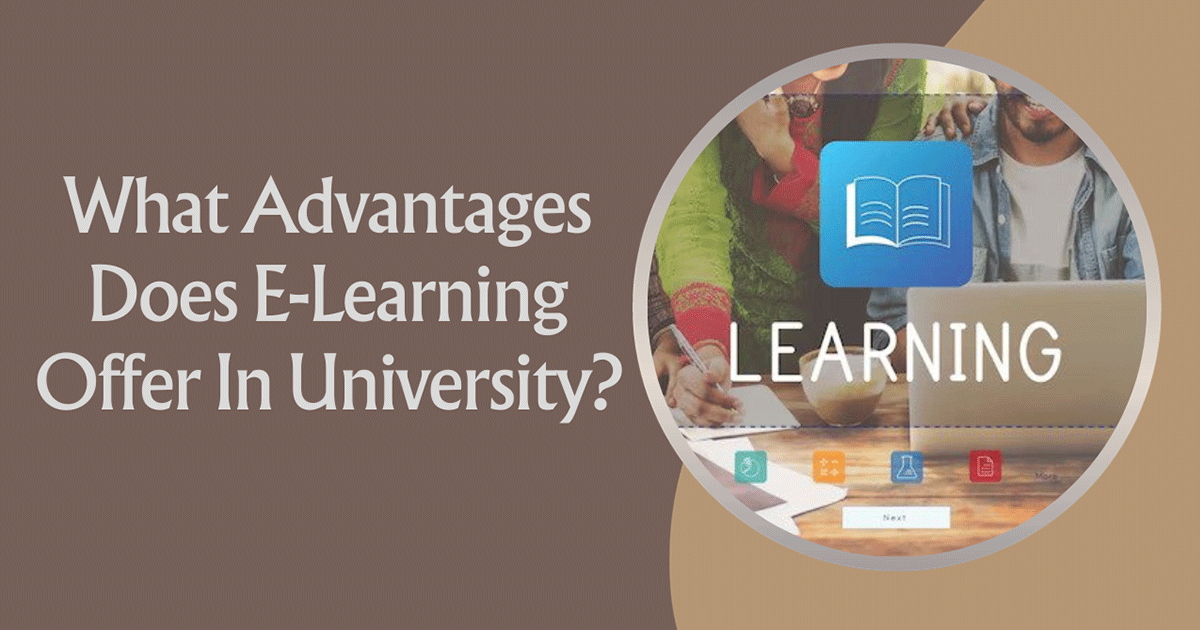E-Learning : In the ever-evolving realm of education today, traditional brick-and-mortar classrooms have relinquished their monopoly over higher learning pursuits. Enter E-Learning, or the digital pedagogue, an ascendant force that proffers an arsenal of advantages capable of profoundly augmenting the academic sojourn. In the forthcoming exposition, we embark upon an exploration of the merits that e-learning bestows upon the realm of university education, illuminating the reasons underlying its meteoric rise in contemporary academia.
The educational sphere, in tandem with technological advances, undergoes an epochal metamorphosis, with e-learning positioning itself at the vanguard of this paradigm shift. In an age where the aegis of technology extends an invitation to students for their academic odyssey, it has ushered forth a plenitude of advantages.
1. Flexibility And Convenience
Foremost among the cornucopia of virtues heralded by e-learning in university education is the quintessential attribute of flexibility. At their own discretion, students access a treasure trove of course materials and erudition, unburdened by the fetters of time and place. This unfettered adaptability proves especially propitious for those ensnared by the throes of part-time employments, familial duties, or manifold commitments.
2. Access To A Panoply Of Courses
E-learning platforms unfurl a veritable cornucopia of courses, including esoteric subjects that might not otherwise grace the hallowed halls of a traditional institution. This ecumenical assortment avails students the opportunity to explore the recesses of their intellectual curiosity and broaden their horizons.
3. Personalized Learning

E-learning platforms, often orchestrated by algorithms, dispense customized pedagogical experiences. These algorithms intuitively decipher a student’s strengths, frailties, and pacing proclivities, thereby furnishing them with tailored recommendations and learning resources.
4. Cost-Effectiveness
Embarking upon a scholastic voyage at a venerable institution entails prodigious expenditures, encompassing tuition fees, lodgings, and the tribulations of commuting. E-learning, with its erasure of many of these pecuniary impositions, bequeaths unto education a more economically viable and universally accessible visage.
5. Interactive Pedagogy
E-learning espouses interactive pedagogy, manifested through the avenues of discussion boards, quizzes, and multimedia presentations. This engenders active student engagement, prodding them towards enthusiastic participation in the learning milieu.
6. A Crucible For Time Management Proficiency

The crucible of e-learning compels students to forge the crucible of effective time management. Navigating the labyrinthine corridors of assignment deadlines and virtual classroom attendances necessitates a dexterous command over temporal allocation, a skill endowed with salience in the crucible of professional pursuits.
7. A Melting Pot Of Global Learning Communities
E-learning’s transcendent nature surmounts geographical boundaries, furnishing students with a cosmopolitan canvas upon which to collaborate with peers from every corner of the globe. This exposure to a melange of perspectives enriches the pedagogical experience and primes students for a globally interconnected workforce.
8. Amplified Information Retention
An assemblage of studies have demonstrated the efficacy of e-learning in bolstering information retention, eclipsing its traditional classroom counterpart. This efficacy is a resultant of interactive learning elements and the capacity to revisit pedagogical materials at leisure.
9. Inclusivity Through Accessibility

E-learning platforms are architected to be the citadels of accessibility, opening their gates to individuals encumbered by disabilities. This egalitarian ethos ensures that the citadel of education is accessible to all, irrespective of physical impediments.
10. A Green Pedagogical Epoch
In the eco-conscious epoch, e-learning unfurls its verdant banner. By curtailing the requisites for tangible resources such as paper and transportation, it salutes the burgeoning exigency for sustainability in the domain of education.
11. Catalyst For Career Ascendancy
For the throngs of working professionals, e-learning offers an avenue for furthering their scholastic pursuits without disrupting their professional careers. This dual pursuit can be a harbinger of career ascension and the widening of professional vistas.
12. Catering To Myriad Learning Modalities

In the grand tapestry of academia, each student is a unique warp and weft. E-learning, with its chameleon-like adaptability, caters to a smorgasbord of learning predilections, be they visual, auditory, or kinesthetic, ensuring that students imbibe knowledge in manners most congruous to their individuality.
13. Navigating The Tempest : Challenges And Resolutions
While the promissory notes of e-learning are numerous, they are not devoid of accompanying challenges. The edifices of self-discipline and potential pangs of isolation loom on the horizon. However, with a support scaffold, the art of time management, and spirited participation in virtual enclaves, these challenges can be vanquished.
Conclusion
In summation, e-learning stands as the harbinger of a seismic transformation in university education, offering pliancy, accessibility, and learning that is as tailored as a bespoke suit. Its felicitous impact on information retention, global collaboration, and fiscal frugality is not to be trifled with. As the annals of education continue their inexorable evolution, e-learning is poised to etch an even more indelible imprint on the tapestry of higher education.
Also Read : What Are The Benefits Of Online University Admissions?
FAQs
1. Is E-Learning as effective as traditional classroom learning?
E-Learning can be just as effective or even more so, depending on the course design and the dedication of the learner.
2. Are E-Learning courses recognized by employers?
Many employers recognize and value E-Learning certifications and degrees, especially if they are from accredited institutions.
3. What technology do I need for E-Learning?
You typically need a computer or mobile device with internet access and any software or tools specified by the course.
4. How do I stay motivated while studying online?
Setting goals, creating a study schedule, and staying connected with peers and instructors can help maintain motivation.
5. Can I interact with professors in E-Learning courses?
Yes, most E-Learning platforms facilitate communication with professors through email, discussion boards, or virtual office hours.
Source Image : Freepik.com











